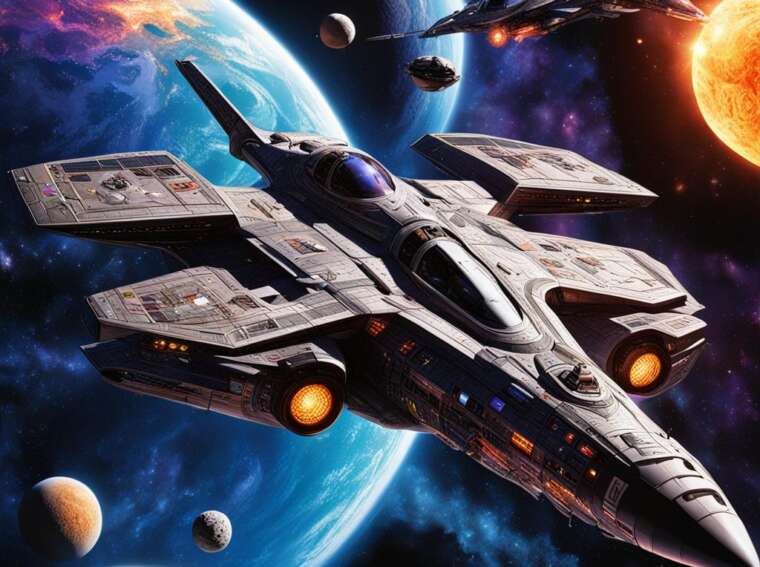Deep Space Nine and Babylon 5 are two iconic science fiction television series that have left a lasting impact on the genre. Both shows were groundbreaking in their own right, pushing the boundaries of what was possible in television storytelling. Deep Space Nine premiered in 1993 as a spin-off of Star Trek: The Next Generation, while Babylon 5 debuted in 1994 as a completely original creation.
Deep Space Nine is set on a space station located near a stable wormhole that allows for travel to the distant Gamma Quadrant. The show follows the crew of the station, led by Commander Benjamin Sisko, as they navigate political intrigue, interstellar conflicts, and personal struggles. Babylon 5, on the other hand, takes place on a space station of the same name, which serves as a neutral meeting place for various alien races. The show explores themes of diplomacy, war, and spirituality as tensions rise between different factions.
Both Deep Space Nine and Babylon 5 were groundbreaking in their approach to storytelling. Deep Space Nine was the first Star Trek series to have an overarching storyline that spanned multiple seasons, allowing for more complex character development and plotlines. Babylon 5 also had a serialized format, with each episode building upon the previous ones to create a cohesive narrative. These shows paved the way for other serialized dramas in the science fiction genre.
Key Takeaways
- Deep Space Nine and Babylon 5 are two popular science fiction television series from the 1990s.
- Both shows feature complex storylines, diverse characters, and political and social commentary.
- Deep Space Nine focuses on a space station and its inhabitants, while Babylon 5 is set on a space station that serves as a hub for interstellar diplomacy.
- Deep Space Nine explores themes of war, religion, and identity, while Babylon 5 delves into topics such as authoritarianism and telepathy.
- Both shows have had a lasting impact on the science fiction genre and continue to be beloved by fans.
The Concept and Premise of Deep Space Nine and Babylon 5
Deep Space Nine is set on a space station located near a stable wormhole that allows for travel to the distant Gamma Quadrant. The show follows the crew of the station, led by Commander Benjamin Sisko, as they navigate political intrigue, interstellar conflicts, and personal struggles. The premise of Deep Space Nine is unique in that it takes place on a stationary location rather than a starship like previous Star Trek series. This allows for a different perspective on the Star Trek universe, focusing more on the politics and social dynamics of the various alien races.
Babylon 5, on the other hand, takes place on a space station of the same name, which serves as a neutral meeting place for various alien races. The show explores themes of diplomacy, war, and spirituality as tensions rise between different factions. The concept of Babylon 5 is centered around the idea of a space station serving as a hub for interstellar diplomacy, with each season building upon the previous ones to create an epic narrative. The show also incorporates elements of mythology and prophecy, adding a layer of mysticism to the science fiction setting.
Characters and Characterization in Deep Space Nine and Babylon 5
Deep Space Nine features a diverse cast of characters, each with their own unique personalities and motivations. Commander Benjamin Sisko serves as the central protagonist, a Starfleet officer who becomes the commander of Deep Space Nine after his wife’s death. Sisko is a complex character who struggles with his role as both a Starfleet officer and a religious figure in the Bajoran religion. Other notable characters include Kira Nerys, a Bajoran resistance fighter turned Starfleet officer; Odo, a shape-shifting security officer; and Quark, a Ferengi bartender who often finds himself involved in shady dealings.
Babylon 5 also boasts a rich ensemble cast, with each character playing a crucial role in the overall narrative. Captain John Sheridan serves as the commander of Babylon 5, a strong-willed leader who must navigate the complex political landscape of the station. Other notable characters include Delenn, a Minbari ambassador who undergoes a transformation throughout the series; Londo Mollari, a Centauri ambassador with a tragic arc; and G’Kar, a Narn ambassador seeking revenge against the Centauri. The character development in Babylon 5 is particularly noteworthy, with each character experiencing growth and change over the course of the series.
Plot and Storyline Comparison of Deep Space Nine and Babylon 5
Deep Space Nine features a number of major plotlines throughout its seven-season run. The show explores the aftermath of the Cardassian occupation of Bajor, as well as the political tensions between the various alien races in the region. The Dominion, a powerful and ruthless empire from the Gamma Quadrant, becomes a major threat in later seasons, leading to a devastating war. Deep Space Nine also delves into complex moral and ethical dilemmas, such as the use of genetic engineering and the nature of free will.
Babylon 5 also has a number of major plotlines that unfold over its five-season run. The show explores the rise and fall of various political factions, as well as the conflict between different alien races. The Shadows, a mysterious and powerful race, serve as the main antagonists throughout the series. Babylon 5 also delves into themes of prophecy and destiny, with characters fulfilling ancient prophecies and facing their own personal demons. The storytelling in Babylon 5 is often epic in scope, with each season building upon the previous ones to create a cohesive narrative.
The Science Fiction Elements of Deep Space Nine and Babylon 5
Both Deep Space Nine and Babylon 5 incorporate a number of science fiction elements into their storytelling. Deep Space Nine explores advanced technology such as warp drive, transporters, and replicators, which are staples of the Star Trek universe. The show also introduces new alien species, such as the shape-shifting Founders of the Dominion and the mysterious Prophets who reside in the wormhole. Deep Space Nine also delves into themes of time travel and alternate universes, adding an extra layer of complexity to its science fiction elements.
Babylon 5 also incorporates advanced technology and alien species into its storytelling. The show features advanced spaceships, artificial intelligence, and telepathic abilities, among other science fiction concepts. Babylon 5 also introduces a number of unique alien races, each with their own distinct cultures and histories. The show explores the political and social dynamics between these races, as well as the conflicts that arise from their interactions. The science fiction elements in Babylon 5 are often used to explore larger themes of power, identity, and spirituality.
The Political and Social Commentary in Deep Space Nine and Babylon 5

Both Deep Space Nine and Babylon 5 incorporate political and social commentary into their storytelling. Deep Space Nine explores themes of war, terrorism, and the consequences of imperialism. The show delves into the aftermath of the Cardassian occupation of Bajor, examining the long-lasting effects of colonialism on both the oppressors and the oppressed. Deep Space Nine also explores themes of religious tolerance and cultural diversity, with the Bajoran religion playing a central role in the narrative.
Babylon 5 also tackles political and social issues in its storytelling. The show explores themes of diplomacy, war, and the abuse of power. Babylon 5 delves into the complexities of interstellar politics, examining the motivations and actions of various factions. The show also explores themes of prejudice and discrimination, with characters from different races and backgrounds learning to overcome their differences. Babylon 5 also incorporates elements of spirituality and mysticism, adding an extra layer of depth to its social commentary.
The Cultural and Historical References in Deep Space Nine and Babylon 5
Both Deep Space Nine and Babylon 5 incorporate cultural and historical references into their storytelling. Deep Space Nine often draws inspiration from real-world events and historical figures. For example, the character of Gul Dukat is often compared to Adolf Hitler, with his charismatic leadership style and genocidal tendencies. The show also explores themes of religious fanaticism and terrorism, drawing parallels to real-world conflicts.
Babylon 5 also incorporates cultural and historical references into its storytelling. The show often draws inspiration from various mythologies and religious traditions, incorporating elements of prophecy and destiny into its narrative. Babylon 5 also explores themes of war and conflict, drawing parallels to real-world conflicts such as World War
The show also incorporates elements of ancient civilizations and historical events, adding a layer of depth to its storytelling.
The Production and Visual Effects of Deep Space Nine and Babylon 5
Both Deep Space Nine and Babylon 5 were groundbreaking in terms of their production and visual effects. Deep Space Nine was the first Star Trek series to extensively use computer-generated imagery (CGI) for its space battles and special effects. The show also featured elaborate set designs and practical effects, creating a visually stunning world for its characters to inhabit. Deep Space Nine also made use of advanced makeup and prosthetics to create its diverse array of alien species.
Babylon 5 also pushed the boundaries of television production at the time. The show was one of the first to extensively use CGI for its visual effects, creating realistic space battles and alien landscapes. Babylon 5 also featured elaborate set designs and practical effects, creating a visually immersive world for its characters. The show also made use of advanced makeup and prosthetics to bring its alien races to life.
Reception and Legacy of Deep Space Nine and Babylon 5
Both Deep Space Nine and Babylon 5 were well-received by critics and audiences alike. Deep Space Nine was praised for its complex characters, serialized storytelling, and exploration of moral dilemmas. The show has since gained a dedicated fanbase and is often regarded as one of the best Star Trek series. Babylon 5 was also praised for its epic storytelling, character development, and exploration of political themes. The show has since gained a cult following and is often regarded as one of the best science fiction series of all time.
The legacy of Deep Space Nine and Babylon 5 can still be felt in the science fiction genre today. Both shows paved the way for other serialized dramas in the genre, such as Battlestar Galactica and The Expanse. The complex characters and moral dilemmas explored in Deep Space Nine and Babylon 5 have also influenced subsequent science fiction series. The legacy of Deep Space Nine and Babylon 5 can be seen in the continued popularity of the Star Trek franchise and the enduring appeal of epic science fiction storytelling.
Which is Better: Deep Space Nine or Babylon 5?
Both Deep Space Nine and Babylon 5 are exceptional science fiction series that have left a lasting impact on the genre. While it is difficult to definitively say which show is better, it ultimately comes down to personal preference.
Deep Space Nine offers a unique perspective on the Star Trek universe, exploring complex political and social dynamics. The show features a diverse cast of characters and tackles a wide range of moral and ethical dilemmas. Deep Space Nine is often praised for its character development, serialized storytelling, and exploration of complex themes.
Babylon 5, on the other hand, offers an epic narrative that spans multiple seasons. The show explores themes of diplomacy, war, and spirituality, with each season building upon the previous ones to create a cohesive story. Babylon 5 is often praised for its character development, political commentary, and use of mythology.
In conclusion, both Deep Space Nine and Babylon 5 are must-watch shows for any science fiction fan. Each show offers a unique perspective on the genre and pushes the boundaries of what is possible in television storytelling. Whether you prefer the political intrigue of Deep Space Nine or the epic narrative of Babylon 5, both shows are sure to captivate and entertain. So why not give them a watch and decide for yourself which one is better?


